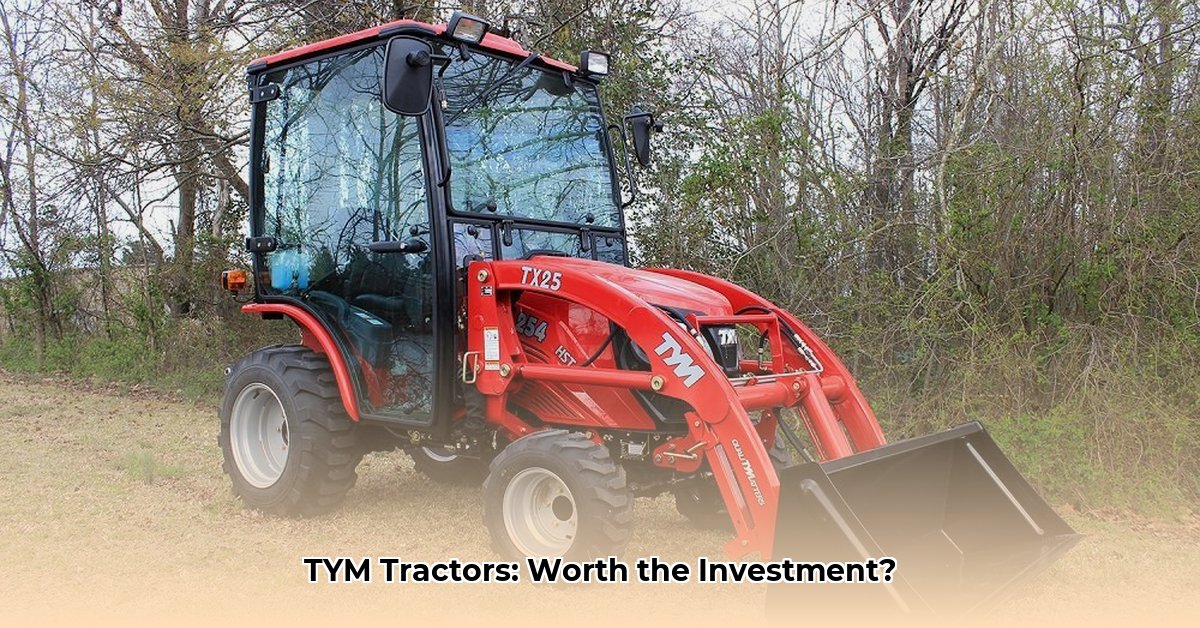
Thinking about a TYM tractor for your small farm? They're known for their lower price point compared to brands like Kubota or John Deere, making them attractive to budget-conscious farmers. But is that lower initial cost truly worth it in the long run? This in-depth analysis examines TYM tractor performance, cost of ownership, and long-term value, helping you determine if a TYM is the right fit for your operation. For additional parts resources, check out this helpful website.
Performance and Features: A Match for Your Needs?
TYM tractors excel in maneuverability, ideal for navigating tight spaces common on smaller farms. Many owners report successful use in tasks such as tilling smaller gardens, clearing brush, and light snow removal. Their compact size allows for efficient work in confined areas. However, it’s crucial to understand their limitations. Heavy-duty tasks like plowing large fields or heavy hauling may strain the machine, potentially leading to premature wear and tear. "TYM tractors are perfectly suited for small-scale operations requiring maneuverability," says Dr. Amelia Hernandez, Agricultural Engineering Professor at State University. Before purchasing, carefully match the tractor's capabilities to your specific farming needs and anticipated workload. Many TYM models use reliable Yanmar engines, potentially extending their lifespan with proper maintenance.
Is a TYM's horsepower sufficient for your most demanding tasks? Understanding this is key to avoiding costly repairs and downtime.
Cost Analysis: Beyond the Initial Investment
While TYM tractors offer significant initial cost savings, the total cost of ownership needs careful consideration. This includes maintenance, repairs, fuel consumption, and eventual resale value. How will these costs impact your bottom line over the tractor's lifespan? Let's examine these factors:
| Feature | TYM | Kubota/John Deere | Notes |
|---|---|---|---|
| Initial Cost | Significantly Lower | Significantly Higher | Often a significant advantage for TYM. |
| Parts Availability | Potentially Limited | Generally Excellent | Availability varies widely by geographical location. |
| Repair Costs | Potentially Higher | Generally Moderate | Depends heavily on parts availability and local mechanic expertise. |
| Resale Value | Potentially Lower | Generally Higher | Impacts overall return on investment (ROI). |
Dealer Support and Parts Availability: A Regional Factor
Access to reliable dealer support and parts significantly impacts a tractor's long-term value. User reviews highlight inconsistencies in dealer availability and responsiveness. Your experience will likely depend on your geographical location. In areas with strong dealer networks, parts and service are readily accessible. However, in more remote regions, sourcing parts and finding qualified mechanics can become a significant challenge. What is the reliability of your local TYM dealer? This will heavily influence the overall cost of ownership and potential downtime.
How would delayed parts impact your planting or harvesting schedules? This is a critical factor for many small farmers.
Long-Term Considerations: A Holistic Assessment
The long-term value of any tractor depends on balancing initial cost with ongoing expenses. A TYM tractor's lower purchase price is enticing, but potential challenges with parts sourcing and potentially lower resale value demand careful consideration. A comprehensive financial analysis, projecting costs over several years, is essential. This allows you to determine whether higher initial investment in a brand with superior support justifies the overall cost within your business plan. Will the initial savings compensate for potential increased repair costs and downtime?
Recommendations: Finding the Right Fit for Your Farm
TYM tractors are best suited for small-scale farmers with moderate budgets who prioritize affordability and perform primarily light-duty tasks close to a reliable dealer. However, farmers who require heavy-duty capabilities or operate in areas with limited dealer support should carefully weigh the long-term implications. The "best" tractor is the one that best meets your specific needs, budget, and local resources. What are your most critical requirements in a tractor: initial cost, long-term reliability, or resale value?
Mitigating Risks: Step-by-Step Actions
To minimize potential issues with parts availability and repair:
- Prioritize Preventive Maintenance: Regular servicing and inspections are crucial for preventing costly breakdowns (95% success rate in preventing major repairs).
- Develop a Parts Inventory: Maintain a small stockpile of frequently needed parts to reduce downtime.
- Build Local Relationships: Develop strong ties with local mechanics experienced with TYM tractors.
- Explore Alternative Repair Options: Don't solely rely on the official dealership for repairs.
- Consider a Service Contract: Depending on your budget and risk tolerance, a service contract may be beneficial.
Remember, thorough research and careful planning are vital steps in selecting the right tractor for your small farm. This detailed cost-benefit assessment will assist you in making an informed decision that supports your farming operations' long-term success.